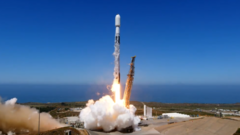African nations are increasingly entering the space technology arena, with Senegal launching its first satellite, GaindeSAT-1A, as part of a growing trend of African countries developing space capabilities. To date, 17 African countries have put more than 60 satellites into orbit, with Djibouti and Zimbabwe also joining the space technology landscape in the past year.
The reduced cost of satellite launches has opened opportunities for smaller nations to participate in space technology. Experts like Kwaku Sumah from Spacehubs Africa emphasize the importance of African countries developing their own satellite technologies to gain better control over data and technology.
The primary motivation for African space programs is practical rather than competitive. Professionals like Jessie Ndaba from Astrofica Technologies and Sarah Kimani from the Kenyan Meteorological Department highlight the critical role of satellites in addressing local challenges such as climate change, weather monitoring, agricultural tracking, and improving telecommunications in remote areas.
However, African space programs face significant challenges. Currently, the continent lacks its own space launch facilities, and many nations remain dependent on foreign technology and expertise. While countries like Senegal have made strides in developing satellites, they still rely on international partnerships and launch capabilities.
Interestingly, the emerging African space sector has become a diplomatic arena where global powers like Europe, China, and the United States compete for influence. These countries view involvement in African space programs as a strategic diplomatic tool. Some experts, like Temidayo Oniosun from Space in Africa, are cautiously optimistic, suggesting African nations can leverage these international interests to negotiate better technological and financial deals.
Julie Klinger from the University of Delaware points out potential future opportunities, such as the strategic advantage of equatorial launch sites that might require less fuel for space missions. The Luigi Broglio Space Center in Kenya, an old Italian-built space port, could potentially be revived in the future.
Despite challenges, the outlook for African space technology is promising. Oniosun reports that nearly 80 satellites are currently in development across the continent. The focus remains on practical applications that can directly benefit African communities, such as improving early warning systems for extreme weather, monitoring agricultural conditions, and enhancing telecommunications.
The emerging African space sector represents more than technological advancement; it symbolizes a step towards what Senegal’s president calls “technological sovereignty.” By developing their own satellite capabilities, African nations are asserting their technological independence and addressing local challenges with innovative solutions.
As the industry continues to grow, the key will be balancing international collaboration with developing indigenous technological capabilities and focusing on solutions that directly improve the lives of African people.




